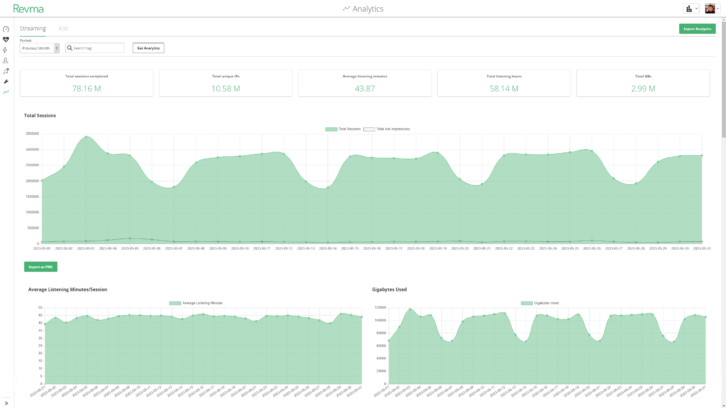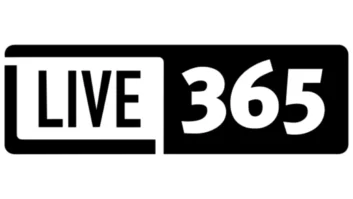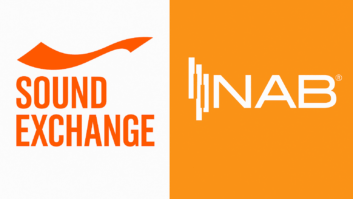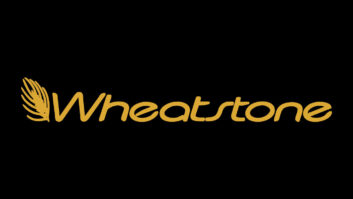Broadcast software company RCS offers Revma, a streaming package for radio groups. It provides an administration portal with customizable user management; listener reports per stream or aggregated for all sources; and multiple audio formats including HLS, MPEG-DASH, HTTPs and F-MP4.
It is compatible with popular audio ad providers for inserting ads in streams; it works with all ad serving protocols and can replicate whatever the encoder is exporting, along with additional streams, known as relays, to create various bit rate streams.
Philippe Generali is president/CEO; this interview is from the Radio World ebook “The Ecosystem of Streaming.”
Radio World: RCS calls Revma “an affordable and complete online professional streaming solution.”
Philippe Generali: We want to be an end-to-end source for broadcasters and webcasters, a one-stop shop. We do it for music scheduling, automation, traffic, news — any tool people need at their station — so they have only one local person to call, whether they’re in China, Johannesburg, Paris or New York.
Revma is no different. We create music content with Selector, we play it out with Zetta and then with Revma we send the stream all the way to the listener’s player wherever they are.
RW: This is another product based in the cloud?
Generali: The software is natively cloud-based. We have a CDN with several locations around the world, which makes it very reliable and allows us to offer failover; if one location has a problem you can switch to a different location seamlessly. In traditional broadcasting you never want to have dead air, and that’s now the rule for streaming also. The number one thing our customer wants is reliability, so we have all kinds of systems in place to detect anomalies.
We’ve also been leading the charge for the virtualization of sound processing. We work with companies like Sound4, Omnia and Orban to offer a software version of their processing for your streams. You don’t have to have physical equipment anywhere. The same with PPM and electronic ratings. We’ve helped build the cloud culture that has developed in the industry,
Now in a way we’re coming full circle because we have a pending product called Sound Center that’s basically an all-in-one box with containerized software that you place at your facility. It will do your encoding, sound processing and PPM.
RW: What’s the advantage of that, given everything we’ve heard about the cloud and its benefits?
Generali: Some people want to prepare — to see how the cloud works and whether it’s reliable. As a supplier you want to go with your customers, at their own speed, in managing how they move to the cloud. So we can give it to them in a box first.
The bottom line is that there are many options. But virtualization helps the streaming world immensely, and with virtualization, services that used to be associated with hardware now are available on a monthly leased basis.
RW: Are there best practices you would want readers to know about to get the most out of their streams?
Generali: Metadata is important. I think it was Fred Jacobs who said you want to look as good as you sound.
We’re also introducing a service called Audio Display. While not directly related to the topic of streaming, this allows a broadcaster to send impeccable metadata, with proper album art, proper spelling of title and artist, all matching whatever platform you display it on. It’s great in the car, where your station needs to look perfect because you are being compared to Spotify and other music platforms.
Audio Display works with RDS and HD Radio, so you can create a new revenue stream. And you can display an advertiser of your choice during a commercial break, not necessarily the one that’s on the air. You might decide that your entire break will be sponsored on the display of the car by 1-800-LAWYER — “If you’ve had an accident, call us at this number and we’ll take care of you.” That can be a significant source of revenue.

iHeartMedia uses it across its terrestrial and HD channels but we’re offering it to the entire industry.
RW: Would you agree there has been a significant increase in consumer uptake of radio’s streaming output?
Generali: Yes, by all measures. The industry in general is doing very well. IP audio and personalized advertising on streams really attract digital buyers.
Streaming used to be an appliance that allows a station to be on the internet. Now, not only has it now been virtualized, but you can know exactly how many listeners you have, at any second, on your stream. We can match that against your log to see if there’s a trend — whether a particular song gets a lot of skips, or whether three songs in a row of a certain type causes people to tune out or give you more retention.
It’s easy to offer premium channels too. For instance Bauer Media in the United Kingdom came to us early on and said, “We want to do something groundbreaking for streaming live content. We want to let the listeners skip a song.” So we built a little delay into the stream. With music, nobody’s really listening to the FM and the stream at the same time; it’s not time-sensitive as in a sports event.
We let the listener skip a song and insert a compatible replacement song chosen by Selector based on the criteria of your station, such as the last time the artist played. When the song is over, we stitch back. This allows a listener to tailor their music a little bit, and it’s another way for a music director to do some research. Bauer offers a premium stream that allows the listener to do this. It will mostly appeal to P1 listeners, who are giving you their feedback both actively and passively.
In the same vein, if you can skip a song, you can skip a spot; so you can offer premium channels where listeners can do that. Or you can insert spots. You may have a three-minute break on your terrestrial, but because we know how to stitch back, you can have a two-minute break or a four-minute break; you can maximize the stream based on the listener.
At the end of the day you want to make it sound good. As recently as five years ago, the sound volume of streaming commercials would suddenly collapse or blast through the roof. Those days are over.
Watch a presentation by Nate Mumford of RCS on technical considerations of Revma and its available analytics and reports.







